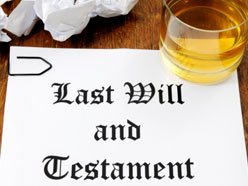All pet owners have one thing in common: they absolutely love their furry friends, and often hold cherished memories of the first day they brought Fluffy home. But have they added pets to their wills?
There are two certainties in life – death and taxes

The majority of Canadians appoint family over friends as the executor of their will, according to a BMO Financial Group study.

It's difficult to distinguish an estate from other trusts
If a client asks you to ensure his laundry, dirty or clean, isn’t aired after he dies, follow this simple rule: keep the will out of probate.

So you're not an estate lawyer; that doesn't mean you should steer clear of trusts. These legal structures can be powerful planning tools, allowing clients to reduce taxes, split income, and ensure their final wishes are carried out to the letter.
One third (31%) of Canadians between the ages of 45 and 64 don't have a will, according to a CIBC poll conducted by Harris/Decima. And of those who do, the majority (44%) hasn’t updated it in more than five years.
They must be created by a living settlor who’s at least 65. With an alter-ego trust, the settlor is entitled to receive all the trust income that arises before she dies. With a joint-partner trust, the settlor and/or her spouse (or common-law partner) are entitled to receive all the trust income until the death of […]

It is not a social media story. And yet you know the medium has come of age when your Facebook and Twitter accounts and photos are considered digital assets that must be part of your estate planning.

The income tax act provides that a charitable gift gives rise to a donation tax credit in the calendar year in which the gift was made. And, to the extent the donation tax credit is not claimed in that year, it may be carried forward and claimed in any of the donor’s five succeeding taxation years.